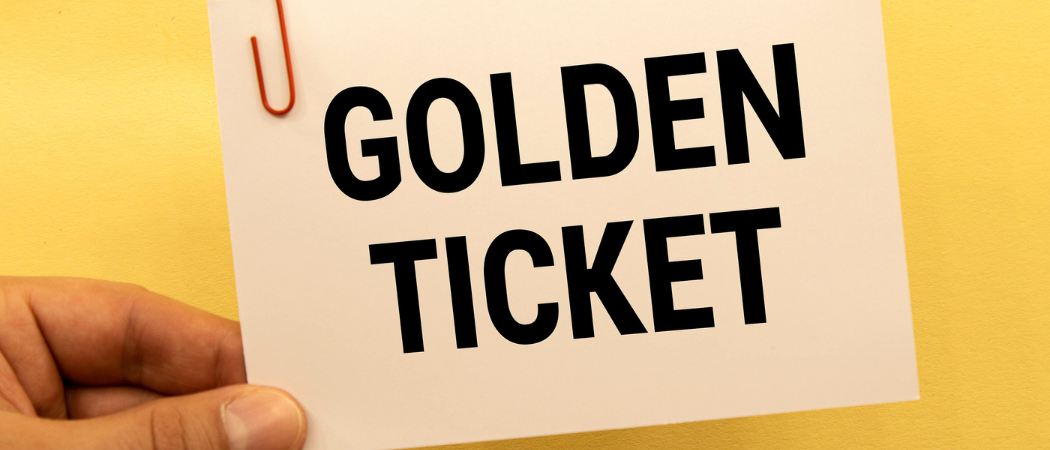The agency wants to give individual reviewers the power to fund proposals they think are promising, even if other panellists disagree. The aim is to avoid only backing the least controversial applications

The US National Science Foundation (NSF) is looking to give its review panel members a ‘Golden Ticket’ to fund proposals they think have great potential, even if this goes over the heads of other panellists and programme officers.
NSF hopes the pilot could help shake up how it distributes its $8.8 billion annual budget, preventing a “regression to the mean” in consensus-based funding decisions that risk rewarding only the least divisive proposals, not those with most potential.
“We’re definitely thinking about it seriously,” said Erwin Gianchandani, who leads the NSF’s newly established directorate for technology, innovation and partnerships, which focuses on promoting commercialisation of NSF-funded research.
Currently, when the NSF issues grant calls, proposals are assessed first by review panel members, who then feed their recommendations through to programme officers, who ultimately decide what gets funded.
Right now, these programme officers already have their own discretion to award a grant to a proposal that “wasn't quite as highly ranked” but still stood out, Gianchandani said. A Golden Ticket would also give this discretion to review panel members too.
“If I'm a reviewer, for instance, and I am really enamoured with a particular proposal […] but the rest of the panel is not as excited about it, but I think that there's a nugget here that is really potentially transformative, I can elevate that particular proposal by virtue of one Golden Ticket,” said Gianchandani.
The NSF pilot is part of a broader wave of experimentation by scientific funding agencies to make their grant-making less conservative and bureaucratic, and bet on higher risk, higher reward proposals.
With grants decided by review panel consensus, the danger is that proposals that divide opinion don’t get funded. “On occasion […] there's a certain regression to the mean that takes place,” acknowledged Gianchandani.
The NSF isn’t the first organisation to toy with Golden Tickets. Denmark’s Villum Foundation also piloted the idea in 2017, alongside anonymous applications. It found that a sizable proportion of successful grants would not have won funds under a consensus-committee driven system.
Interest has also been growing in using a lottery system to make funding decisions simpler when funding is massively oversubscribed. The British Academy of humanities and social sciences announced a trial of a partially randomised system for grants up to £10,000 last September.
Promoting discovery
The wider context to these experiments is growing concern that the pace of scientific and technological breakthrough has slowed, putting pressure on research funding agencies to find new ways to promote discovery.
“I'm not going to necessarily say science is slowing down,” said Gianchandani. But it is “incumbent upon us to think about new and creative ways of how we support the research.”
A Nature paper published on 4 January, which looked at tens of millions of journal articles and patents since 1945, found that “papers and patents are increasingly less likely to break with the past in ways that push science and technology in new directions.”
The problem is that scientists are relying on an ever-narrower slice of knowledge, they conclude, and need to be given more time to read widely.
The NSF wants to pilot the Golden Ticket idea on close-to-market research where success or failure should be observable in the short term – although it is not yet decided on exactly which programmes will be selected.
Trialling the scheme on fundamental research is not such a good idea, as it might take 15 to 20 years to see whether projects awarded with a Golden Ticket really had more potential than others, pointed out Gianchandani.
Of course, it’s possible that Golden Tickets won’t make much difference. “It could very well be the case that you run this experiment, and you find that reviewers use their Golden Tickets on projects that were going to get funded anyway. That would be insightful in itself,” Gianchandani said.
He declined to give a timetable for exactly when the Golden Ticket pilot, which was first reported last November by the Wall Street Journal, might be rolled out, but said it is just one of several ideas being considered within the NSF to shake up the grant-making process.
“We want to think about what are the various concepts that we should think about, what's easier to pilot, what's a little bit of a heavier lift, and so forth,” said Gianchandani. “So I would say this is not the only one.”





 A unique international forum for public research organisations and companies to connect their external engagement with strategic interests around their R&D system.
A unique international forum for public research organisations and companies to connect their external engagement with strategic interests around their R&D system.